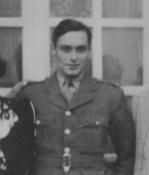
|
The King's School Canterbury |
Roll of Honour |
| Lieutenant Oliver Kirby JOHNSON (251050) | |
|
245th Field Company Royal Engineers Date of birth: 25th February 1923 Date of death: 20th May 1944 Killed in action aged 21 Buried at Beach Head War Cemetery Anzio Plot XV Row A Grave 10 |

|
| He was born on the 25th of February 1923, the elder son of Harry Linscott Kirby Johnson, electrical engineer and company director, and Rita (nee Jewell) of 23 Hillside Drive, Edgware, Middlesex, and later of Ifield in Sussex. He was educated at the King's School Canterbury from September 1936 to July 1941 where he came to the school with an Exhibition in Mathematics. He was elected as a Scholar and as a Senior King's Scholar in 1938, achieving his Higher Certificate in 1940. He was appointed as a house monitor in School House in September 1940, editor of the Cantuarian and held the rank of Sergeant in the Officer Training Corps in 1940 as well as winning his 2nd XV colours in the same year. He was appointed as a School Monitor in September 1940 and as Head of House in January 1941. Although he was destined to join his father's engineering works he was keen on joining the army and joined the Home Guard on its inception while still at school. He was an excellent shot and was accepted under the university training scheme for the Royal Engineers and went to Corpus Christi College, Cambridge, where he continued to play rugby, until he broke his leg during a match, and was awarded his colours for rowing. He completed the sixteen week training course in six weeks. He was commissioned as a 2nd Lieutenant in the Royal Engineers on the 1st of November 1942 and was posted to the Middle East where he joined the 245th Field Company. He was sports officer for his unit and formed a Rugby XV and Football XI for his men while in the Middle East. He took part in the assault on Sicily with the 8th Army and was in the first landing at Anzio, taking part in the battle for the beachhead. On the 17th of July 1943 he wrote to the school to say that he and his men were fit and on top of the world and that "Nothing can stop us!" On the 20th of May 1944 Oliver Johnson and three officers of the 1st Battalion Yorkshire Regiment (Green Howards) and two men set out on a night time reconnaissance to see where a bridge could be built for the infantry to cross. The mission passed successfully with a suitable site having been found. When returning through the minefield and within sixty feet of their own front line a Corporal of the Green Howards, who was accompanying him, trod on a mine. Oliver Johnson, who was crawling a few feet behind him, was killed instantly by the blast. His Housemaster wrote:- "I always feared that "O.K" would be one of those who never came back for his whole life was modelled on service to others. His affectionate unselfish character found full scope in the Army, where he undertook many activities for his men, which he liked so much. At first sight one might think him too quiet and unassuming but when one got to know him one realised that these qualities were but the outward expression of the deeper sentiments of loyalty and modesty which became him so well. He was in fact a perfect gentleman, brave and courteous to the last and his loss will be felt by all those who came into contact with him." His father donated a portrait of General Bernard Law Montgomery (OKS) to the school and wrote the following about his son:- "He almost worshipped Monty and was very proud of the fact that he carried out the first big job for Monty in Italy, on the day after the British landing after Sicily. I learnt after Oliver's death from his Sergeant that Monty was pulled up by an enemy road demolition and Oliver bypassed him and his staff through a railway tunnel by making a temporary road to link up, on his own initiative. I also learnt that Oliver landed as Sapper officer with the first company of infantry to set foot in Sicily--so that, apart from airborne troops, he was one of the first fifty to land in the invasion of Europe." The Oliver Johnson Gift at the King's School was created in his memory. He is commemorated on the war memorial at Corpus Christi College Cambridge. |
|
| School House |
Back